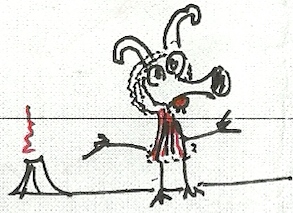I have maybe half-a-dozen novels in progress. I have harbored grand ambitions. But I'm terrible about follow-through. All but two of the novels are nothing but vaporware, as they call it in the software industry.
In reviewing some notes this weekend, I found several "outlines" for novels that aren't even "in progress" – they're just ideas for "someday." Something has induced me to want to put these "germs of novels" out into the world – perhaps my thinking is that, if I don't get to it, someone else, some day, might want to, if they find a particular idea intriguing or appealing in some way. So I thought I might publish some of these novel outlines here on this blog.
If you run across this and think – Oh, I'd love to write that idea, you're welcome to do so. It'd be nice if you gave me at least a sentence in an acknowledgements section, but I won't even hold you to that.
Here is one of my favorites among these novels not-being-written.
The Korean Cowboy
(drafted in fall of 2010, updated and expanded spring of 2013)
Over a period of many years, a Korean engineer named Kim Yeong-cheol became progressively more and more obsessed with American cowboy culture. When his wife committed suicide and he lost custody of his children to his in-laws, he decided to take off for America to pursue his dream of becoming a cowboy. Much to his own surprise, through several turns of luck and sheer obstinacy, he ended up becoming a semi-pro rodeo competitor, billed to rodeo fans as "The Korean Cowboy."
After several years, Yeong-cheol returned to Korea, and following the exhortations of old college friends and his aged mother, he tried to re-integrate to Korean life. But he has become estranged from his children, and so he decided to embark on a rather quixotic project to bring American cowboy culture to Korea.
He started with his parents' farm in Jeollanam. He bought some horses, spending his savings from the rodeo circuit and some windfall from his father's passing, and he imported some rodeo gear.
Yeong-cheol struck up a relationship with a local Catholic orphanage, and he taught some of the boys in the area riding and roping skills. He became well-known in his area as a bit of an eccentric but kind-hearted man, and he even got to make an appearance on a human interest television show. Soon he had a small "rodeo school" set up that was in fact breaking even financially.
Unfortunately, just as he was regaining a relationship with his son and daughter, his son got murdered by a corrupt police officer, and his daughter, Hye-jin, ended up badly disfigured and temporarily in a coma by the same incident.
Because of this, Yeong-cheol embarked on a peculiar path of righteous wrath and vengeance, in a single-minded effort to expose the corruption of the local police chief and political officials. He recruited a group of mentally and socially handicapped delinquents to assist in his quest, and among them is his own bitter but highly competent daughter, whom Yeong-cheol fails to recognize due to her disfigurement.
Together Yeong-cheol and Hye-jin battled the corrupt forces of power, and ended up befriending an AWOL American GI named Ricardo Blackhorse, a Native American / Chicano mix with roots in New Mexico, who had been framed by his corrupt US Army sergeant for some crime. They were later joinedtoo, by a high-ranking North Korean refugee, a former general in the North Korean Army, who, disillusioned with the South's materialism, had decided to throw in his lot with these eccentrics.
The story ended quite tragically, of course, with a flight across South Korea on horseback and a crash and burn at the DMZ at the end, confronting South Korean police helicopters, American military police and North Korean artillery.
I suppose I conceptualize this novel cinematically, but also with elements of that amazingly great novel by Hal Borland, When the Legends Die. Imgaine a cross between that novel and a good buddy outlaws western, but set in modern South Korea. I will confess that the first draft of this outline was made shortly after seeing The Good, The Bad and The Weird, which is a fabulous Korean remake of Sergio Leone's famous The Good, The Bad and The Ugly. That movie translates the action from the American west in the post-civil war period to Manchuria in the 1920's, but I became curious as to how one could make a "Korean Western" in a contemporary setting and keep it culturally believable and authentic.
 I am grateful to all my friends and family who have been showing support to me in these difficult times. I want to especially thank my friend and boss, Curt, and KarmaPlus’ subdirector Helen. They are truly caring and decent human beings. Other coworkers (and former coworkers) have been nothing but kind too.
I am grateful to all my friends and family who have been showing support to me in these difficult times. I want to especially thank my friend and boss, Curt, and KarmaPlus’ subdirector Helen. They are truly caring and decent human beings. Other coworkers (and former coworkers) have been nothing but kind too.